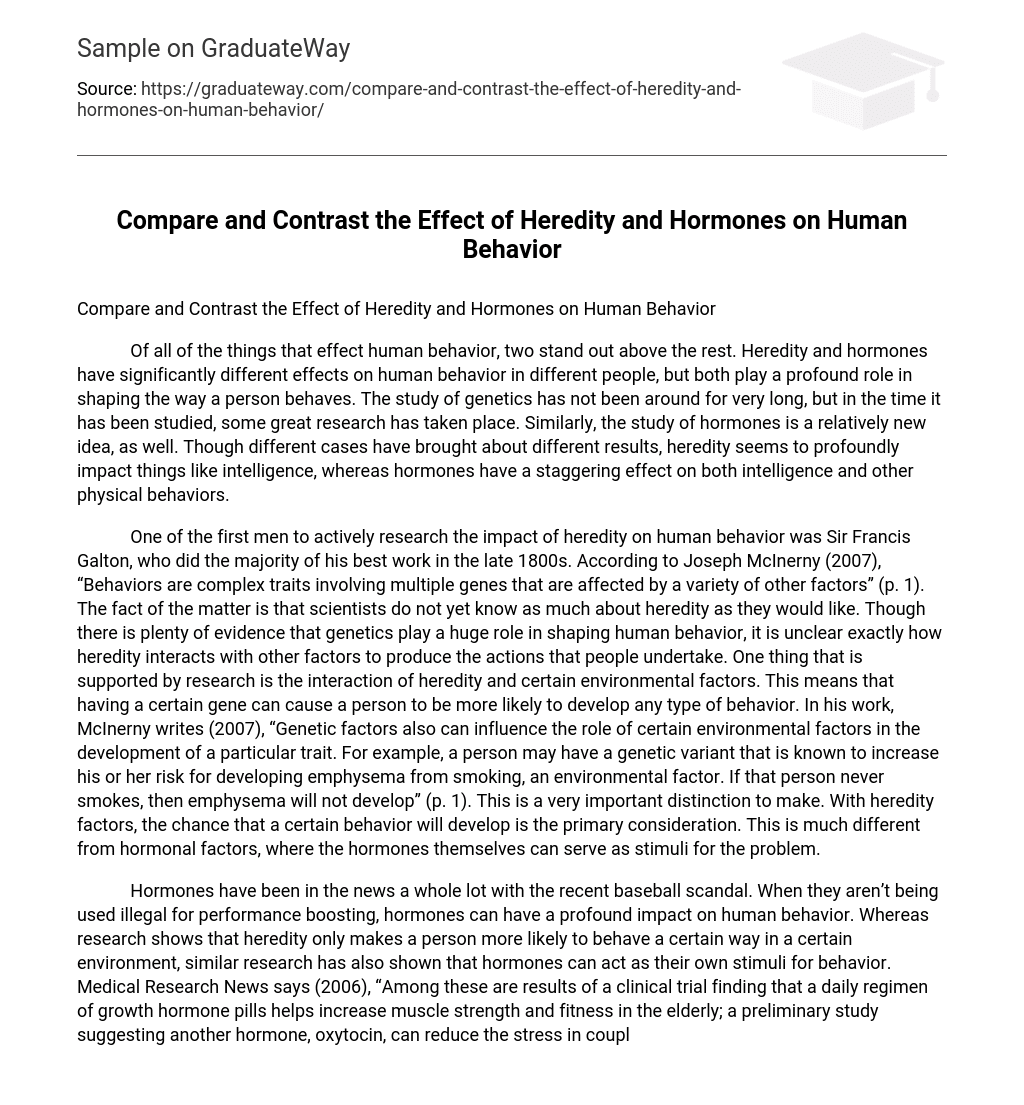Of all the things that affect human behavior, two stand out above the rest: heredity and hormones. These factors have significantly different effects on different people, but both play a profound role in shaping behavior. The study of genetics is relatively new, but great research has already taken place. Similarly, the study of hormones is also a relatively new idea. Although different cases have brought about varying results, heredity seems to profoundly impact intelligence while hormones have a staggering effect on both intelligence and physical behaviors.
One of the first men to actively research the impact of heredity on human behavior was Sir Francis Galton, who did the majority of his best work in the late 1800s. According to Joseph McInerny (2007), Behaviors are complex traits involving multiple genes that are affected by a variety of other factors” (p. 1). Scientists do not yet know as much about heredity as they would like, despite plenty of evidence that genetics play a huge role in shaping human behavior. It is unclear exactly how heredity interacts with other factors to produce people’s actions. However, research supports the interaction between heredity and certain environmental factors, meaning that having a certain gene can cause a person to be more likely to develop any type of behavior.
McInerny (2007) also notes that genetic factors can influence the role of certain environmental factors in developing particular traits: “For example, a person may have a genetic variant that increases their risk for developing emphysema from smoking—an environmental factor. If that person never smokes, then emphysema will not develop” (p. 1). This distinction is crucial because with hereditary factors, the chance that a particular behavior will develop is primary consideration—this differs significantly from hormonal factors where hormones themselves can serve as stimuli for problems.
Hormones have been in the news a lot lately due to the recent baseball scandal. While they are often used illegally for performance enhancement, hormones can also have a profound impact on human behavior. Research has shown that heredity only makes a person more likely to behave in a certain way in a particular environment, but hormones can act as their own stimuli for behavior.
Medical Research News reported in 2006 that clinical trials found growth hormone pills increased muscle strength and fitness in the elderly. Additionally, preliminary studies suggest oxytocin can reduce stress levels in couples who argue and research has pinpointed causes of aggression in men (p.1).
Studies have also shown that hormones are more likely to significantly impact human behavior during early years, particularly adolescence when individuals are susceptible to being swayed by their own hormones. According to Judy L. Cameron of the University of Pittsburgh (2004), Adolescence is marked by change encompassing physiological changes associated with pubertal development, changes in social status and stresses faced by individuals, and changes in behavioral affect regulation” (p.1). The relationship between hormones and human behavior is quite different from that between heredity and human behavior, although they share similarities.
The primary differences between the two have to do with the stimulus for action. If someone has a predisposition to act in a certain way due to their genetic makeup, then something in the environment must prompt that behavior. For instance, a person who has an inherited tendency towards compulsive gambling is much more likely to indulge that trait in Las Vegas than if they were sitting on a couch in Iowa. However, a person with a hormonal imbalance causing that type of urge might plan a trip to Las Vegas because of the hormone. This is one way scientists have found successful in their somewhat limited research on human behavior.
Overall, both heredity and hormones play a substantial role in dictating human behavioral patterns. However, the specifics of human behavior are still determined by various other factors. It is the combination of all these factors that eventually causes a certain behavior to occur. At the ground level, it appears that heredity and hormones are two of the foremost factors in pushing a person towards one behavior over another.
References
Cameron, J. L. (2004). Interrelationships between Hormones, Behavior, and Affect during Adolescence: Complex relationships exist between reproductive hormones, stress-related hormones, and the activity of neural systems that regulate behavioral affect. Comments on Part III. Retrieved February 22, 2008 from http://www.annalsnyas.org/cgi/content/abstract/1021/1/134.
Medical Research News (2006) reported on new research regarding the brain, hormones, and behavior. The article can be found at http://www.news-medical.net/?id=18291 and was retrieved on February 22, 2008.
McInerney, J. (2007) defines behavioral genetics as the study of genetic and environmental influences on behavior. According to McInerney, this field of study aims to understand how genes and environment interact to shape behavior. The article can be accessed at http://www.ornl.gov/sci/techresources/Human_Genome/elsi/behavior.shtml.





